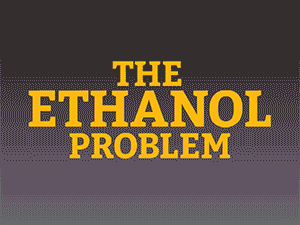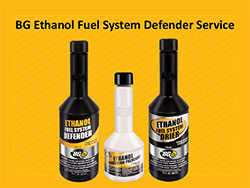E10 (10% Ethanol in fuel) is here - Are YOU prepared?
 |
The standard (95 octane) petrol grade in Great Britain has become E10 (10% Ethanol).
Some 5% of cars, particularly pre-2011, classics and some motorcycles, aren't compatible and these drivers should purchase 'super grade' petrol.
But even if you're not one of these 5% of motorists, are YOU aware of the downsides of the move to E10?
E10 petrol contains up to 10% renewable ethanol, which will help to reduce carbon dioxide (CO2) emissions associated with petrol vehicles and tackle climate change. Petrol in the UK previously contained up to 5% renewable ethanol (known as E5).
-
Ethanol attracts, absorbs, holds water
-
Causes damage, corrosion & deposits
-
Solution? BG's Fuel Defender Service
So moving to E10 has major environmental benefits - but it also brings downsides. Let’s take a look at some of the problems associated with the new Ethanol mixtures:
Water - Ethanol is hygroscopic, which means it attracts moisture from the air, and absorbs and holds water. Among many things, it is highly temperature-dependent and can freeze in cold weather. If too much water gets into the fuel, Ethanol and water will settle at the bottom of the tank. This process is called ‘phase separation’. Just one drop over the limit can cause all the water to separate from the fuel, leaving an incombustible pool at the bottom of the petrol tank.
Acid - Ethanol is acidic, which accelerates corrosion in metal system components. Some corrosion materials can move through the system and fill the fuel filter. Sealants on pipes and joints in the fuel system can also be adversely affected by a reaction with the acidic ethanol, leading to leaks and deposits moving through the system. Water will also add to corrosion throughout the fuel system, particularly as the Ethanol contains oxygen.
Deposits - Heavier deposits occur in lower concentrations of Ethanol-containing petrol because Ethanol is not compatible with the traditional detergents in petrol. The Ethanol destabilises the petrol and increases its tendency to oxidise and degrade, thus leaving deposits when combusted. Deposits can also interrupt the fuel/air ratio and cause severe drivability problems, like poor economy and hesitation.
Loss of economy - E5 and E10 mixtures will lower overall fuel consumption for a number of reasons:
- Ethanol contains less BTUs (British Thermal Units – a measure of its ability to convert to energy) than petrol.
- The Ethanol’s tendency to absorb moisture lowers the energy value in combustion.
- The tendency to create deposits interferes with injector spray patterns and the fuel/air ratio.
Excessive heat - A recent US study identified that higher burn temperatures were leading to more carbon deposits than anticipated; these deposits will interfere with the intended fuel/air flow and affect performance. Another consequence of the higher heat was that the oil will heat up and form some sludge; the heat means that the oil and other substances will literally burn onto surfaces of the engine. Piston rings and valves are subject to this “cooking” issue.
E10 could cause particular problems for motorbikes owners. With many bikes being stored over winter or used intermittently, the fuel left in the tank runs the risk of going stale and undergoing ‘phase separation’ - where the ethanol falls out of solution with the petrol as it absorbs more water. This could result in an engine that won’t start. And this could happen in as little as three months!
So, is there anything the motorist or biker can do to mitigate these factors?
Yes, add the BG Ethanol Fuel System Defender Service to YOUR armoury.
 |
- BG Fuel System Defender (or sister product BG CF-5) used every 3,000-4,000 miles contains special stabilizers that prevent fuel oxidation, gum and varnish formation. This improves performance and power and restores fuel economy. Corrosion inhibitors form a coating that protects the fuel system.
- BG Ethanol Fuel System Drier forms a stable solution with water and gas allowing more water to pass harmlessly through the fuel system.
- BG Ethanol Corrosion Preventer used at each fill-up neutralizes acids in the fuel and keeps the entire fuel system clean. Corrosion inhibitors form a coating that protects the fuel system.
Search online for BG44K reviews from around the World – BG Products are used in 3 times more garages in the US than any competitor!
Find your local Stockist

Click the menu button at the top of the page and enter your postcode to identify a local independent garage stockist near you.
Motorcycle owners - Contact your local centre. Midlands: Vertu Honda Nottingham and Vertu Honda Grantham
Trade enquiries, please contact us via the form below:

})